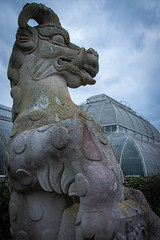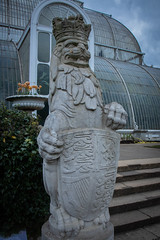I discovered this statue on a little photo-walk I took to kill some time over the Easter weekend. I was quite struck by this, as it looks a little more dynamic than the normal statues you see in London to celebrate our war-heros. This is Earl Alexander of Tunis, and stands outside the
Guard’s Museum in Central London.
Earl Alexander of Tunis was born Harold Rupert Leofric George Alexander in 1891 in London. Born to English/Irish parents, he was educated at public schools, and in 1911 was commissioned as an Office in the
Irish Guards after graduating the
Royal Military Academy, Sandhurst.
When the First World War started, Alexander formed part of the original British Expeditionary Force which was sent to fight on the Western Front in France. During this time he rose to Captain in 1915, the Major in 1917, although at this time he often acted as a Lieutenant-Colonel. During his time on the Western Front, he was wounded twice, and for his bravery and sacrifice he received the Military Cross in 1916, and later that year he was appointed to the Distinguished Service Order. The citation for which read:
“For conspicuous gallantry in action. He was the life and soul of the attack, and throughout the day led forward not only his own men but men of all regiments. He held the trenches gained in spite of heavy machine gun fire.”
Rudyard Kipling, who wrote a history of the Irish Guards, said:
“it is undeniable that Colonel Alexander had the gift of handling the men on the lines to which they most readily responded… His subordinates loved him, even when he fell upon them blisteringly for their shortcomings; and his men were all his own.”
After World Was One, Alexander led units loyal to the Republic of Latvia in an attempt to eject the Bolsheviks from Latvia. He then served in Turkey and Gibraltar, before being appointed to command the 1st battalion of the Irish Guards.
In 1934, Alexander was made a temporary brigadier, and given command of the Nowshera Brigade on the Northwest Frontier in India. For his service there, and in particular for his actions in the Loe-Agra operations between February and April 1936, Alexander was that year made a Companion of the Order of the Star of India, and was mentioned in despatches.
In March 1937, Alexander was appointed as one of the aides de camp to the recently acceded King George VI and in May returned to the United Kingdom to take part in this capacity in the state procession through London during the King’s coronation. Following the coronation celebration, Alexander returned to India, where he was made the honorary colonel of the 3rd Battalion 2nd Punjab Regiment, and then in October 1937 was promoted to the rank of Major-General making Alexander the youngest general in the British Army. However, in 1938, he relinquished command of his brigade to return to Britain to take command of the 1st Infantry Division.
Following the outbreak of the Second World War, Alexander, and the 1st Infantry Division were send to France, and was part of the successful retreat from Dunkirk in May 1940. He was placed in command on the beachhead, and left Dunkirk on 3rd June after ensuring that all the British troops had been evacuated. Again, for all his efforts, Alexander was mentioned in despatches. On his return to Britain, Alexander was made General Officer, Commanding in Chief, responsible for the defence of South-West England. During this time, he was knighted.
In February 1942, after the Japanese invasion of Burma, he was sent to India, where he became a full General. He was put in command of the Fourteenth Army, but left all the tactical conduct of the campaign to his corps commander, while he handled the more political aspects of relations with the commander of the Chinese forces. Once again, Alexander was mentioned in despatches for his Burma Service, and once they had completed their fighting, and had returned to India.
In July 1942, Alexander was recalled to Britain. He was then selected to take part in “Operation Torch” the invasion of North Africa., and was made Commander-in-Chief of the Middle East Command, and made responsible for the conduct of the campaign in the desert of North Africa. Alexander presided over Montgomery’s victory at the Second Battle of El Alamein, and the advance to Tripoli, for which he was made a knight grand cross of the Order of the Bath.
After the Anglo-American forces from Operation Torch and the Eighth Army converged in Tunisia in February 1943, they were brought under the unified command of a newly-formed 18th Army Group headquarters, commanded by Alexander and reporting to Dwight D. Eisenhower, the Supreme Allied Commander in the Mediterranean at the Allied Forces Headquarters. The Axis forces in Tunisia surrendered by May 1943, and Alexander’s command became the 15th Army Group, which was still under Eisenhower’s command, and responsible for mounting the invasion of Sicily.
When Eisenhower was appointed Supreme Allied Commander for the planned Normandy Landing, he suggested that Alexander become ground forces commander, as he was popular with both British and US officers. However, this request was denied, and Alexander remained in command of the 15th Army Group, and, with the support of numerous allied commanders, controversially authorised the bombing of the historic abbey at Cassino, which resulted in little advance on the German Winter Line defences. It was not until the fourth attempt that the Winter Line was breached by the Allies, and Alexander’s forces moved on to capture Rome in June 1944.
Alexander remained in command of 15th Army Group, for most of the Italian Campaign, until December 1944, when he relinquished his command to become the Supreme Commander of the Allied Forces Headquarters, responsible for all military operations in the Mediterranean Theatre, and was promoted to the rank of field marshal.
As a reward for his leadership in North Africa and Italy, Alexander was given a peerage and was created Viscount Alexander of Tunis and Errigal in the County of Donegal.
In 1946 Alexander was appointed Governor-General to Canada, and spent a great deal of time travelling around Canada during his 5 years as Governor. Amongst Canadians, Alexander proved to be a popular viceroy, despite the calls for a Canadian-born governor general that had preceded his appointment. Not only did he have a much praised military reputation, but he was also a charismatic figure with an easy ability to communicate with people.
Alexander departed the office of Governor General of Canada in early 1952, after Churchill asked him to return to London to take the post of Minister of Defence in the British government, as the ageing Churchill had found it increasingly difficult to cope with holding that portfolio concurrently with that of prime minister. In March 1952, Alexander was made Earl Alexander of Tunis by the new Queen, and was appointed to the organising committee for the the Queen’s coronation, where he carried the Sovereign’s Orb in the state procession during the coronation.
As Earl. he served as the British defence minister until 1954, when he retired from politics and, in 1959, the Queen appointed Alexander to the Order of Merit.
Alexander died on 16 June 1969 of a perforated aorta.His funeral was held on 24 June 1969 at St George’s Chapel, Windsor, and is buried near his family’s home in Ridge, Hertfordshire.
After researching the Earl, I am so pleased that this statue has made him look so active. He was obviously a popular leader, and a very brave man.










